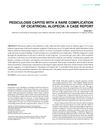66 citations,
February 2007 in “The journal of investigative dermatology/Journal of investigative dermatology” Adenosine may promote hair growth by increasing FGF-7 levels in dermal papilla cells.
[object Object]  6 citations,
February 1974 in “The BMJ”
6 citations,
February 1974 in “The BMJ” The document concludes that scalp disorders can be treated with hair washing, specific shampoos, medications, and sometimes surgery or hair transplants, but hereditary baldness is untreatable.
April 2021 in “Libyan journal of medical sciences” A woman's hair loss improved with treatment after a COVID-19 infection.
 14 citations,
April 2021 in “Clinical, Cosmetic and Investigational Dermatology”
14 citations,
April 2021 in “Clinical, Cosmetic and Investigational Dermatology” COVID-19 may trigger sudden temporary hair loss.
 6 citations,
October 2019 in “Case Reports in Dermatology”
6 citations,
October 2019 in “Case Reports in Dermatology” The document concludes that treatment can improve hair growth and symptoms in Fibrosing Alopecia in a Pattern Distribution.
 6 citations,
July 2003 in “Journal of Womens Health”
6 citations,
July 2003 in “Journal of Womens Health” Experts say proper treatment and sensitivity are important for women's facial skin issues like acne and unwanted hair.
March 2023 in “Agroland: The Agricultural Sciences Journal/Agroland : The Agricultural Sciences Journal” Pontianak Aloe Vera is beneficial for skin and hair care in various cosmetic products.

Hair loss should be medically treated, as non-medical treatments are ineffective and hair loss can indicate serious health issues.
 12 citations,
February 2001 in “Annals of Pharmacotherapy”
12 citations,
February 2001 in “Annals of Pharmacotherapy” No effective treatment for hair loss after childbirth was found, but it usually gets better on its own and some cosmetic methods might help.
 April 2016 in “Journal of The American Academy of Dermatology”
April 2016 in “Journal of The American Academy of Dermatology” People with hair loss have low zinc levels; zinc supplements and laser therapy may help.
 40 citations,
August 2018 in “Skin appendage disorders”
40 citations,
August 2018 in “Skin appendage disorders” Some alternative treatments for hair loss might work, but more research is needed.
 7 citations,
October 2018 in “Dermatology practical & conceptual”
7 citations,
October 2018 in “Dermatology practical & conceptual” Topical oxygen therapy may improve treatments for hair loss, acne, and chronic skin diseases with minimal side effects.
 September 2023 in “International Journal of Trichology”
September 2023 in “International Journal of Trichology” Tofacitinib helped a woman regrow hair with no major side effects.
2 citations,
March 1994 in “Journal of the European Academy of Dermatology and Venereology” White piedra can be effectively treated with 2% miconazole nitrate lotion.
 January 2018 in “International Journal of Medical Reviews and Case Reports”
January 2018 in “International Journal of Medical Reviews and Case Reports” A 6-year-old girl with head lice developed scarring hair loss but improved with treatment.
 12 citations,
January 2014 in “The Pan African medical journal”
12 citations,
January 2014 in “The Pan African medical journal” Minoxidil caused unwanted hair growth in a child, but stopped after stopping treatment.
 5 citations,
February 2004 in “The New England Journal of Medicine”
5 citations,
February 2004 in “The New England Journal of Medicine” The book provides updated knowledge on hair disorders and new treatments for hair loss.
 2 citations,
August 2017 in “Dermatologic Therapy”
2 citations,
August 2017 in “Dermatologic Therapy” Topical cetirizine 1% increases hair density and may be a promising treatment for hair loss.
 53 citations,
January 2014 in “Journal of Cutaneous and Aesthetic Surgery”
53 citations,
January 2014 in “Journal of Cutaneous and Aesthetic Surgery” Microneedling combined with triamcinolone can safely stimulate faster hair regrowth in people with Alopecia Areata.
 27 citations,
September 2018 in “Medicines”
27 citations,
September 2018 in “Medicines” Oleic acid nanovesicles improve minoxidil absorption in hair follicles for alopecia treatment.
4 citations,
March 2007 in “Annales de Dermatologie et de Vénéréologie” Hair care products can cause skin irritation and allergies due to certain chemicals.
 2 citations,
December 2017 in “Bangladesh Journal of Pharmacology”
2 citations,
December 2017 in “Bangladesh Journal of Pharmacology” Black seed oil significantly protects against hair loss from chemotherapy.
 August 2023 in “Indian journal of pediatrics/Indian Journal of Pediatrics”
August 2023 in “Indian journal of pediatrics/Indian Journal of Pediatrics” Topical treatments helped a child with Down syndrome and severe hair loss regrow most of his hair.
 August 2018 in “Journal of the American Academy of Dermatology”
August 2018 in “Journal of the American Academy of Dermatology” Calcipotriol may effectively treat hair loss in alopecia areata, working better in children than adults.
Low Vitamin D3 levels are linked to hair loss in female students in South India.
[object Object]  January 2015 in “Hair therapy & transplantation”
January 2015 in “Hair therapy & transplantation” Some botanical products may help increase hair growth in people with alopecia, but more research is needed.
 February 2004 in “The New England Journal of Medicine”
February 2004 in “The New England Journal of Medicine” The book is a comprehensive and current guide on hair disorders, with minor flaws.
June 2020 in “Acta medica Philippina” Topical adenosine may effectively and safely treat hair loss.
 September 2004 in “PubMed”
September 2004 in “PubMed” Androgenetic alopecia, or hair loss, is influenced by hormones and genetics, and can be treated with medications like minoxidil, finasteride, or hormone therapy, with effectiveness evaluated after 6 months.
 25 citations,
June 2015 in “Clinical, Cosmetic and Investigational Dermatology”
25 citations,
June 2015 in “Clinical, Cosmetic and Investigational Dermatology” Microneedling helps increase the absorption of a melanin product into hair follicles, which may improve laser hair removal effectiveness.






















